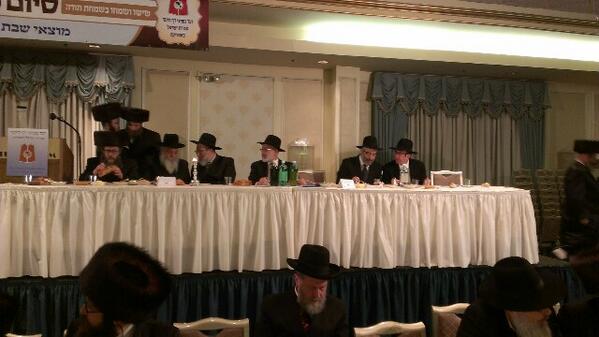After his uncle called on his chassidim not to attend the Siyum HERE the Rebbe participated at a Siyum for Daf Yomi in Monsey.


from BJL photo credit: Yosef Rappaport/ Hamodia
At the first event, an overflow crowd of close to 1,500 Yiddish-speaking participants gathered Motzoei Shabbos Vayerah at the Atrium Plaza in Monsey for a sit-down melavah malkah and siyum. Organized by the Daf Yomi Commission of Agudath Israel of America in conjunction with numerous major kehillos in Rockland County, the celebration was made possible by a group of energetic young askanim who worked tirelessly to make the event a success.
“Even with the siyum being held in this large a hall, and after adding additional space during the program, at times we had standing room only,” said Rabbi Avrohom Nisan Perl, Director of the Torah Projects Commission of Agudas Yisroel, and main organizer of the event. “Throughout Rockland County we have thousands of lomdei Daf Hayomi, at dozens of venues, so it is no wonder that so many came to celebrate.
HaRav Tuvia Wetenstein, Dayan of the Belzer community in Monsey, introduced the evening by reading a letter from the Belzer Rebbe, written exclusively for the occasion.
Harav Yisroel Hager, the Rav of Vizhnitz in Monsey and a son of the Vizhnitzer Rebbe, was mesayem the mesechta. He spoke about the meaning of having a daily obligation to learn the Daf. The Rav related that when he was a young bachur he decided to learn a blatt Gemara every day. After a couple of years, a new cycle of the Daf Yomi started, and this presented him with a dilemma of either keeping his own seder or starting anew with the rest of klal Yisroel.
His father, the Vizhnitzer Rebbe, encouraged him to ask his maternal grandfather, the Skverer Rebbe, zt”l. “My Zeideh, zt”l, asked me, ‘why not keep both sedarim?’” the Rav said.
After the siyum the entire crowd joined the dais in joyous dancing, led by the inspiring “Meshorerim” choir of chassidic singers. The group, accompanied with music, sang classical melodies extolling Torah learning throughout the evening — including one that was composed by Rav Shapiro, zt”l.
Following the dancing, Harav Yisroel Hager, the Vizhnitzer Rebbe of Eretz Yisroel, spoke about the need to learn Torah with pure intent. The Rebbe pointed out that Gemara is not an academic subject to be studied as any other subject. One must rather learn it with devotion to Hashem.
“Someone once told the Sanzer Rav that he learned a few masechtos,” the Rebbe related. “The Rav asked him, ‘but what did those masechos teach you?’”
“One who learns Torah must internalize its teachings, so that the lessons become part of his very being,” the Rebbe added. The Rebbe then quoted the words of his grandfather, the Imrei Chaim of Vizhnitz, during his hesped of Rav Shapiro. The Imrei Chaim spoke of the thousands of blatt Gemara that greeted the Lubliner Rav in Heaven.
The Rebbe, who is a member of the Mo’etzes Gedolei Hatorah of Eretz Yisroel, praised in particular the work of Agudath Israel of America in spreading the limud of Daf Yomi by repeating the words of the Imrei Chaim: that Agudath Israel’s mission is to proclaim Hashem’s reign over the entire world through learning Torah.
The Rebbe was followed by HaRav Yosef Yisroel Eisenberger , Skvere Dayan who conducted the haschala of Meseches Shekolim.
Rabbi Gedaliah Weinberger, Agudath Israel’s chairman of the Commission on Torah Projects/Daf Yomi, followed. He retold the story of how Rav Shapiro’s proposal became reality only when the Chofetz Chaim rose in Rav Shapiro’s honor at the Knesiah Gedolah, thus bestowing upon his groundbreaking idea the stamp of approval.
Harav Shmuel Dishon, menahel of mosdos Yad Yisroel of Karlin-Stolin, was the guest speaker. His inspirational drashah was based on the willingness of Avraham Avinu to perform the Akeidah. “The will to sacrifice is deeply ingrained in all the generations since,” said Rav Dishon. “This mesiras nefesh is what sustained the Torah all through the generations though fire and water.”
No comments:
Post a Comment